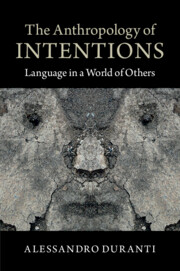Book contents
- Frontmatter
- Contents
- List of figures
- Acknowledgments
- 1 Rethinking anti-intentionalism
- 2 Intentions in speaking and acting: the Standard Theory and its foes
- 3 The avoidance of intentional discourse: a Samoan case study
- 4 The invention of promising in the Samoan translation of the Bible
- 5 Intentionality and truth, revisited
- 6 Speaker intentions and the role of the audience in a political campaign in the US
- 7 A dialogue on intentions
- 8 Opacity of other minds: local theories revisited
- 9 Intentions and their modifications: a lesson from Husserl
- 10 A sense of the other: from intentionality to intersubjectivity
- 11 The intentional continuum
- Appendix A Transcription conventions for English examples
- Appendix B Transcription conventions and abbreviations used in the Samoan examples
- Notes
- References
- Index
2 - Intentions in speaking and acting: the Standard Theory and its foes
Published online by Cambridge University Press: 18 December 2014
- Frontmatter
- Contents
- List of figures
- Acknowledgments
- 1 Rethinking anti-intentionalism
- 2 Intentions in speaking and acting: the Standard Theory and its foes
- 3 The avoidance of intentional discourse: a Samoan case study
- 4 The invention of promising in the Samoan translation of the Bible
- 5 Intentionality and truth, revisited
- 6 Speaker intentions and the role of the audience in a political campaign in the US
- 7 A dialogue on intentions
- 8 Opacity of other minds: local theories revisited
- 9 Intentions and their modifications: a lesson from Husserl
- 10 A sense of the other: from intentionality to intersubjectivity
- 11 The intentional continuum
- Appendix A Transcription conventions for English examples
- Appendix B Transcription conventions and abbreviations used in the Samoan examples
- Notes
- References
- Index
Summary
Introduction
The anthropological critique of the use of intentions for explaining human action focuses on a small group of authors, who helped establish what could be considered the “Standard Theory” of interpretation in linguistics, the philosophy of language, and the cognitive sciences in the twentieth century. In this chapter, I review the Standard Theory, with special attention to Searle’s use of intentions in his model of linguistic as well as non-linguistic acts, Rosaldo’s criticism, and other authors’ earlier accounts and criticism of intentionality as a key feature of meaning. I also return to the question of the universality of the notion of intention by reviewing the history of the term and then engaging in a cross-linguistic analysis that will reveal hidden aspects of the semantic field covered in English by intention, intent, and intending.
The Standard Theory: Grice, Austin, and Searle
The three major authors associated with the standard theory are: H. P. Grice, for whom it is the reliance on intentions that makes linguistic meanings different from all other kinds of phenomena to which an interpretation can be given; John Austin, who included intentions in the felicity conditions for speech acts; and John Searle, who made intentions a central component of his speech act theory, his theory of mind, and, in combination with the notion of “we-intention” (see Chapter 10), his theory of society.
- Type
- Chapter
- Information
- The Anthropology of IntentionsLanguage in a World of Others, pp. 11 - 42Publisher: Cambridge University PressPrint publication year: 2015



